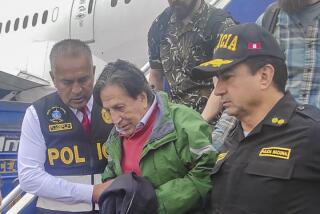Ex-Spy Chief Announces He Plans to Remain in Peru
- Share via
LIMA, Peru — Responding to the uproar caused by his sudden return from exile, former spy chief Vladimiro Montesinos said in a rare public statement Tuesday that he intends to remain in Peru and wants to contribute to peace.
His words had the opposite effect, however. Montesinos’ announcement that he had come home to stay was the equivalent of hurling a grenade into the delicate machinery being constructed by Peruvian leaders and foreign diplomats to prepare for early presidential elections and democratic reforms.
The opposition accused Montesinos and his allies among the nation’s military chiefs of brazenly manipulating the battered government of President Alberto Fujimori to ensure their immunity from prosecution and the dominance of the armed forces in future governments.
Expressing exasperation with both Fujimori and Montesinos, the chief of the Organization of American States hurried here Tuesday in hopes of salvaging a political transition whose foundation was the departure to Panama last month of the spy chief, until then widely viewed as the power behind the president.
OAS Secretary-General Cesar Gaviria wants to revive talks that broke down Monday night between the government and the opposition. On Tuesday, the opposition urged Fujimori to resign. His political opponents criticized the government’s refusal to schedule the elections until the opposition agrees to a sweeping amnesty for crimes committed by soldiers, police and government officials since Fujimori carried out a “self-coup” that temporarily shut down the nation’s Congress in 1992.
Critics said Montesinos returned partly to throw his weight behind the amnesty demand, which would encompass offenses related to drug trafficking and other areas beyond Peru’s war against terrorism in the late 1980s and the 1990s. Sofia Macher, head of a national human rights alliance, called Montesinos’ apparent role in the proposal an act of extortion by “a gangster who should be in jail.”
The mood here has turned strange as well as tense. Montesinos’ comments Tuesday afternoon in a radio interview, one of the few he has ever granted, heightened that sensation. He sounded almost mockingly serene at a time when his defiance of the international community endangers Peru’s stability.
“I am not exercising any function in public administration,” Montesinos said. “I am just a common citizen. . . . I hope with all my heart that all Peruvians can live in peace. That’s my desire. That’s what I am going to dedicate myself to: living in peace, distanced from politics.”
Montesinos said he abruptly left Panama on Sunday because Peruvian terrorists were planning to kill him there. Experts on terrorism scoffed at that claim, saying Peru’s guerrillas are so weak that they must struggle to carry out minor attacks at home, let alone assassinations abroad.
Montesinos’ departure seemed tied to the denial of his request for political asylum in Panama. The U.S. had pressured the Panamanian government to give him refuge after a videotape of the spy chief paying an apparent $15,000 bribe to a politician forced his ouster last month and Fujimori’s decision to hold new elections.
Macher’s group, the National Human Rights Coordinating Council, plans to file a criminal complaint today against the former head of the National Intelligence Service, or SIN. The complaint will accuse Montesinos of responsibility for two massacres by an anti-terrorist death squad in the early 1990s and for the cases in 1997 of two female military intelligence agents--one killed and the other crippled by torture--who were suspected of leaking information to the media, Macher said.
But Montesinos asserted that military courts have already cleared him in human rights cases. And he denied any role in the abuse of the agents.
In response, a lawyer involved in several of those cases said Montesinos has not been cleared, because the military justice system removed the cases from the civilian courts and prevented thorough investigations. Moreover, Montesinos should not have been judged by military courts because he is a civilian, said Heriberto Benitez, a noted human rights lawyer.
“It is a joke,” Benitez said. “He is just trying to clean up his image.”
Opponents acknowledge that prosecuting Montesinos will be difficult because he allegedly exerts influence over the court system. Speculation continues that he is looking for other nations in which he could find a haven; Venezuela is reportedly one option.
More to Read
Sign up for Essential California
The most important California stories and recommendations in your inbox every morning.
You may occasionally receive promotional content from the Los Angeles Times.













